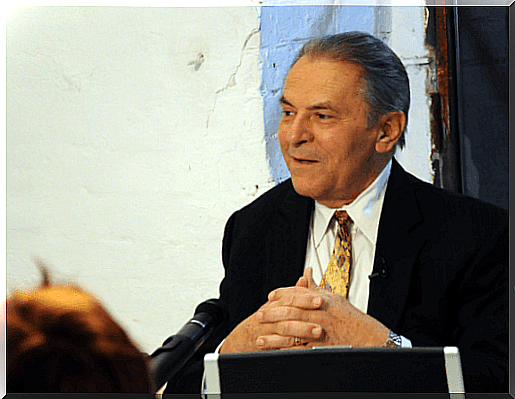Stanislav Grof, Life And Work

One of the most influential people in psychology today is Stanislav Grof. He became famous for his research on altered states of consciousness and holotropic breathing. In addition, he is one of the creators of the most recent form of psychology, transpersonal psychology.
Stanislav Grof was born on July 1, 1931 in Prague, studied medicine and majored in psychiatry. In addition, he trained in Freudian analysis for more than 7 years. His experience is unmatched. Indeed, he has devoted himself to clinical work and research for over 50 years. Incredible, isn’t it?
In this article, we will talk about the life and work of Grof, we will explore the universe of the researcher who studied the mind through psychedelics, and we will take a look at his main contributions to the world of psychology.
Stanislav Grof and transpersonal psychology
In 1969, the term transpersonal psychology was coined, and it was Grof who promoted it along with other authors. Grof has indeed developed these questions with Jamer Fadiman Miles Vich, Sonya Marguiles and Anthony Sutich. In addition, he worked with Abraham Maslow and Ken Wilber. And in 1978, Grof founded the International Association of Transpersonal Psychology.
Grof points out that other forms of psychology place little importance on spirituality. Driven by this conviction, he then began to approach different practices that he believed could be integrated into the study of the human mind. He has conducted research with patients in these areas. Thus, he saved spirituality as a legitimate aspect of our psyche.
Through his clinical practice, his research in transpersonal psychology, and the contributions of other creators, we now have a broader view of psychology, which encompasses various approaches and theories.

Stanislav Grof and psychedelics
Stanislav Grof volunteered for a study at Prague Medical School where he had his first experience with LSD. After his experience, he became interested in research concerning this type of substance. And the effects they could have in our brain. With a group of researchers, he began to study psilocybin, LSD and mescaline in a group of 40 people.
During the process, they performed various psychotechnical tests and biological examinations. The aim of this activity was then to examine whether each of the substances produced specific effects. Or if, together, they produced similar states. Moreover, according to Grof, he wanted to verify the existence of an “experimental psychosis”, which could be of great help in solving the riddle of psychosis.
For 20 years, Grof worked in a psychotherapy laboratory with psychedelics in Prague and the United States. But after this research was banned for, among other things, what could lead to the use of these substances on chromosomes, he moved to the Ealen Institute, where he wrote his first book.
Holotropic breathing
After moving, he also developed, with Christina Grof, the technique of holotropic breathing. This non-pharmacological technique produces states similar to those produced by psychedelics.
If we turn to etymology, the term holotropic comes from the Greek holos , which means totality, and trepein , which means to move forward. That is to say, holotropic would mean the path towards the totality or the act of advancing towards it. It is therefore a mode of self-exploration in which one works with consciousness and integrates various wisdoms from spiritual traditions.
This transpersonal psychotherapeutic technique classifies symptoms, blockages or problems as the product of forgotten or repressed content that can be accessed through expanded states of consciousness or holotropic states.
Now, the questions that are addressed during a holotropic breathing session relate to different states of consciousness, which includes areas like perinatal and ancestors.

Stanislav Grof’s works
As explained on its website, among its publications, there are over 160 articles in professional journals and books. For this reason, we have decided to select the works which, from our point of view, may be the most interesting:
- In search of oneself. It is a guide to personal development. In this book, he describes conditions that are considered psychotic in some cultures. And he makes suggestions for those who experience this kind of feeling. Thus, he shows how these complex states of mind can be beneficial.
- The holotropic mind . In this work, Grof describes various experiences with this type of transpersonal psychotherapy technique. It in turn shows the integration of past experiences, mystical experiences and the relationship between death and rebirth.
- LSD Psychoterapy : This book is devoted to the healing potential of psychedelic medicine. This is perhaps the work that has given Grof the most recognition. It contains a comprehensive guide to the use of LSD in psychotherapy.
- When the impossible happens : adventures in non-ordinary realities . This is a psychonautical autobiography by Grof that allows access to the author’s inner world through the cases and experiences he recounts during his professional career.
- Transpersonal psychology: a global and spiritual approach to develop consciousness . In this text, Grof expresses the foundations of the fourth force of psychology. In addition, he discusses the therapeutic models of different schools of psychology and psychiatry. And there he highlights the contributions of transpersonal psychology.
Stanislav Grof is currently Professor of Psychology at the California Institute for Integral Studies (CIIS) in San Francisco. In April 2016, he married Brigitte Grof, his traveling companion. The two then travel the world organizing seminars and workshops on holotropic breathing in order to educate people about this technique and make it more accessible. In summary, Stanislav Grof is one of the living authors who has revolutionized the world of psychology the most in recent decades.









